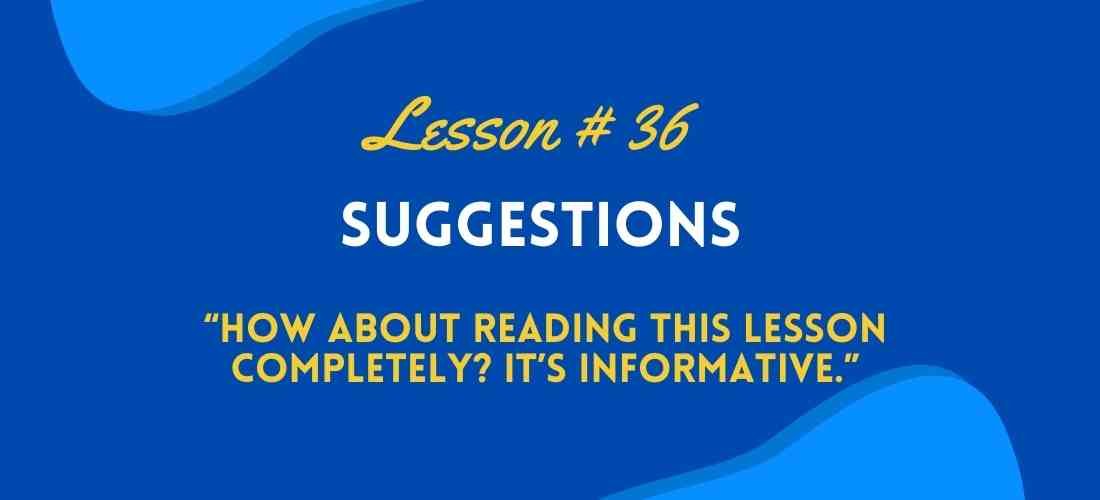Suggestions

“How about reading this lesson completely? It’s informative.”
Whenever we are making a suggestion, we offer someone a piece of advice that we find possible.
For example:
Imagine you were out of the city for a month and are back to your home a day ago. Your phone rang, and your friends tell you to meet up. All of you like to meet at a restaurant but can’t think of any at the moment. So one of you offers an idea.
Tom: let’s meet at the restaurant, but which one?
You: how about going to The Ledbury?
Tom: Great, let’s meet there in an hour.
Did you notice the phrase “how about” in the above conversation? You probably would. How about is a phrase that is used to make a suggestion. There are many more phrases that are used to make suggestions.
In this lesson, you will learn essential phrases in English grammar that one can use to make friendly suggestions.
How about/ what about
How about and what about are phrases that are used to make suggestions. Both of them are interchangeable, but 'what about' is less common in American English.
When you use how about or what about, you ask if someone agrees with what you are suggesting.
How about/ what about are used in questions. Their structure is quite straightforward, but there is more than one way to use how about / what about.
- How about/ what about + subject+ base form of verb + object/ complement (optional)+ ?
Example:
- How about I call you after 10 pm?
- What about we go to the church?
- How about we play cricket?
- How about/ what about + gerund + object/ complement (optional)+ ?
A Gerund is the -ing form of the verb
Example:
- How about playing cricket?
- What about having tea?
- How about going to The led bury?
- What about starting a new business?
- How about / what about + noun phrase + ?
Example:
- How about a burger?
- What about lunch?
Why not / why don’t
Why not and why don’t are also used to make suggestions, but the difference here is that we ask questions using negative.
Why not is used to make general suggestions. It sounds more like advertising. Advertising companies often use why not to sell their products.
The structure of using why not is:
Why not+ base form of verb + object/ complement (optional) +?
Example:
- Why not spend your holidays in the Maldives?
- Why not treat yourself at the Icon restaurant?
We can use why don’t to make specific suggestions. The format of using why don’t is similar to the structure of why not.
Why don’t + subject+ base form of verb + object/ complement (optional) +?
Example:
- You look tired, why don’t you take a break?
- Why don’t we go to Alpine Gelato?
Might
You can use the modal verb ‘might’ to make suggestions, although it is less common in American English, but it helps in offering something. Words like “ prefer and like” always go with might. You can see the difference that all of the phrases mentioned above in this lesson were in question form, but might is used in a positive way.
Structure:
Subject+ might+ verb
Example:
- You might prefer this color.
- He might like these shoes.
- You might love this restaurant.
Let’s, and let’s not.
Let’s and let’s are also used to make suggestions. We use let’s to make suggestions when we are including someone else in our plans. Let’s or let us is informal, and you use it with either friends or the person you are frank with.
The structure of using let’s is easy.
Let’s + base form of verb + object / complement.
Example:
- Let’s play tennis.
- Let’s go to the park.
- I am feeling dizzy. Let’s have tea.
- I am bored. Let’s go shopping.
- Let’s call Paul and ask him to join us at dinner.
Let’s not or let us not is used to make negative suggestions.
Example:
- Let’s not argue anymore.
- Let’s not forget about the promise we made to the mother.
Could
We use could to make two types of suggestions.
- Strong suggestions
- Neutral suggestions
We use could in question to make strong suggestions. The negative form of could (couldn’t) is stronger than could itself.
Example: strong suggestions
A: I have to finish this task tonight.
B: Couldn’t you sleep for a while and complete your task in the morning?
Example: neutral suggestion.
A: I don’t have any dress to wear tomorrow.
B: You could wear that black dress. You look pretty in it.
Could always
You can use ‘could always’ to make weak suggestions. You can either you could always with the subject you or we.
Example:
A: Oh no, I am out of money.
B: You could always use your savings in a bad time.
Can’t you
We can use can’t you to make suggestions, but this sounds very direct if we suggest a person who is present. Likewise, other phrases are used to make suggestions. Can’t you is also used in question form.
Structure:
Can’t you + base form of verb + object/ complement+?
Example:
- Can’t you be on time?
- Can’t you clean the kitchen properly?
- Can’t you finish your homework before leaving the academy?
Conclusion:
In this lesson, you have learned ten essential phrases that are used to make suggestions. Most of them are used in questions. Try to use those phrases that befit in your conversations. Keep in mind that the more you practice, the more you understand English grammar.


